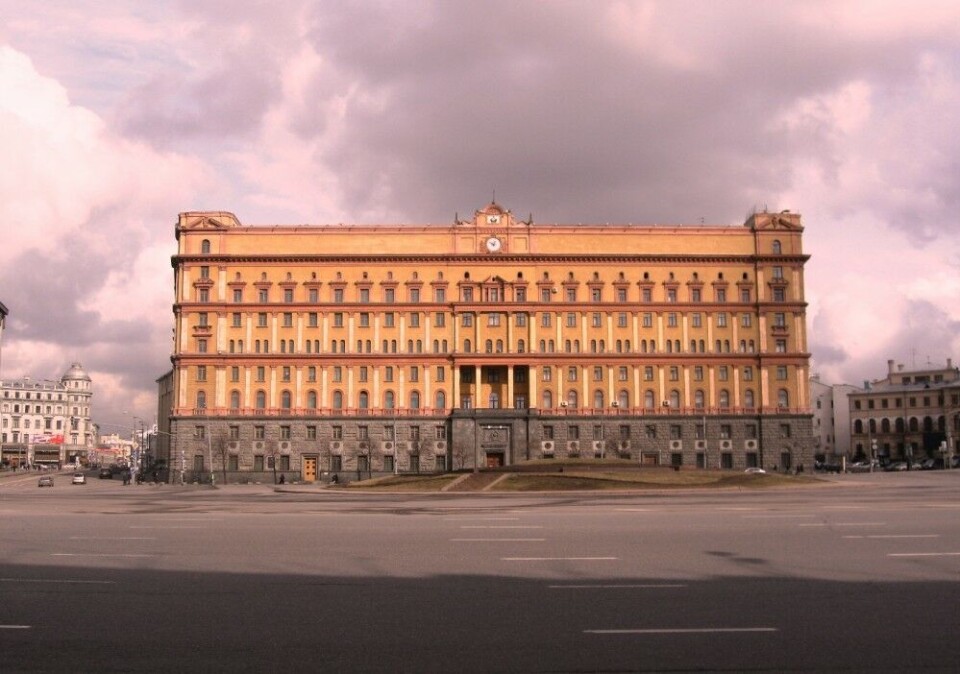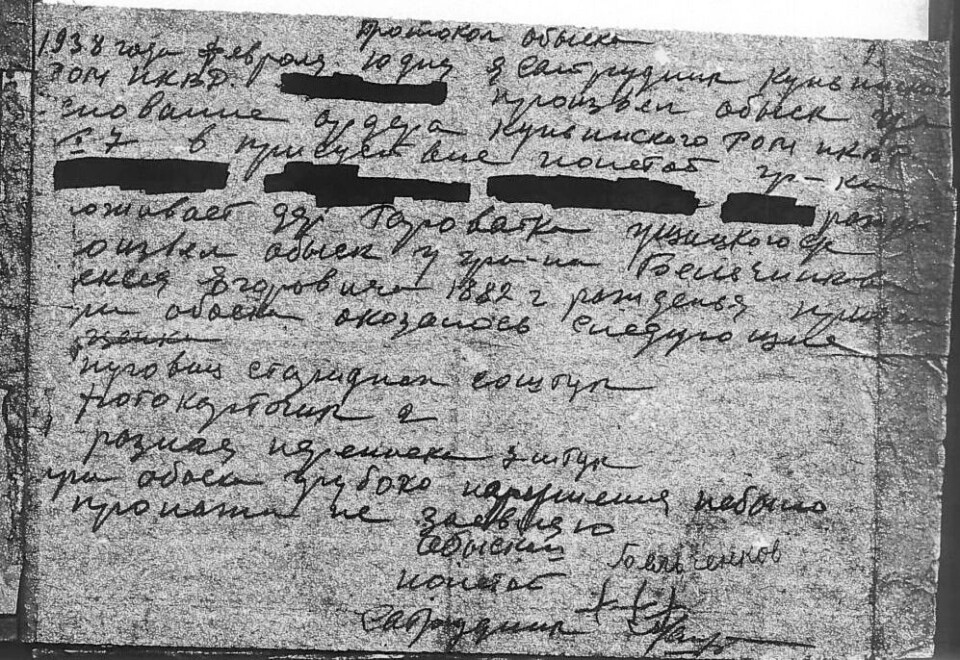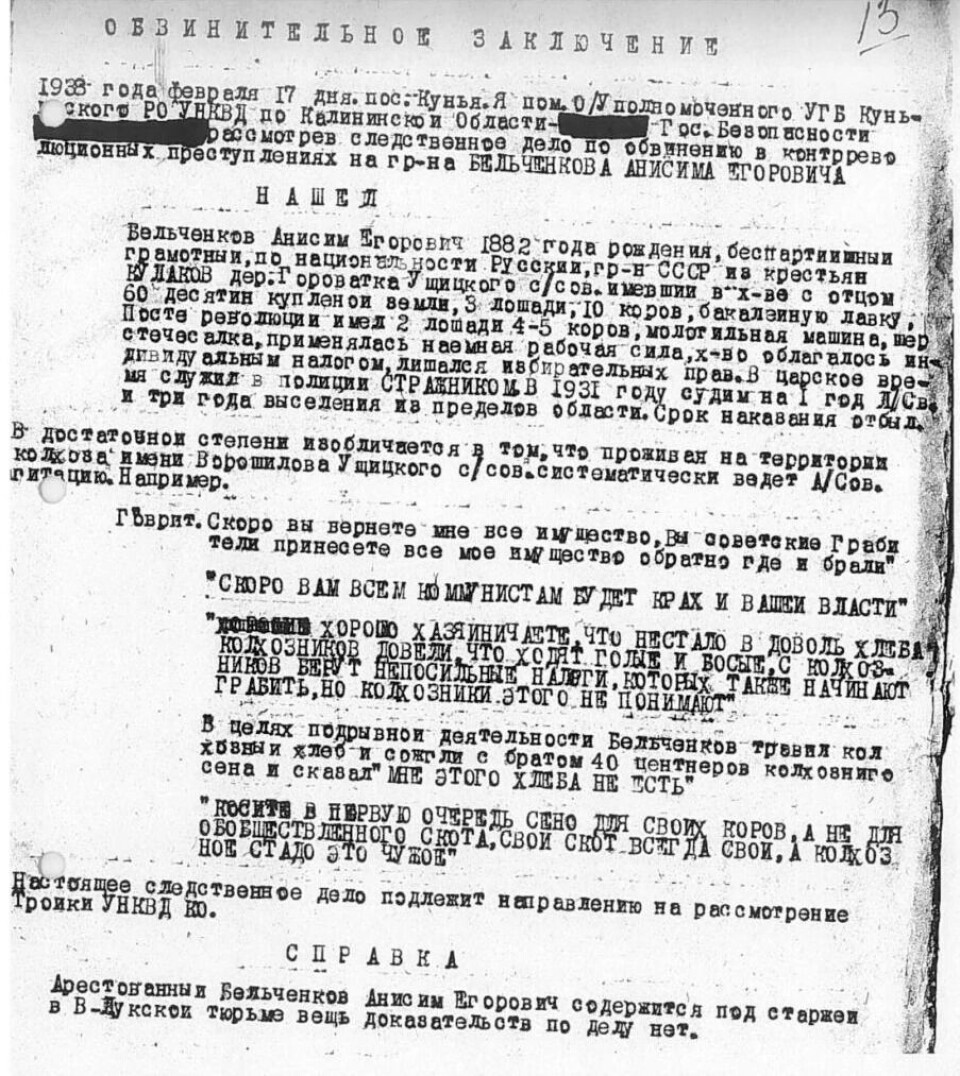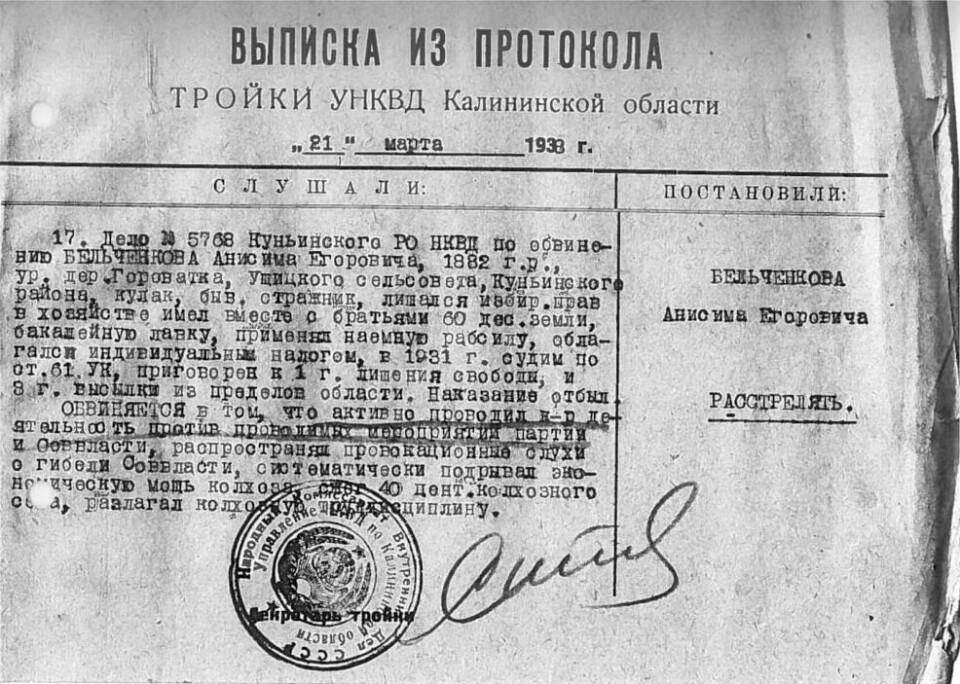
Successors of the Cheka cross out names of forefathers
FSB officers obliterate the names of Stalin's executioners from criminal cases, believing themselves to be their successors
By Tatiana Britskaya
“There are 20 buttons, 2 photo cards and 3 different correspondences. There was no gross violation during the search ”. The owner of the 20 buttons, the Knight of St. George, Aleksei Belchenkov, did not return home that day in February 1938. He disappeared in the Komi camps. His brother Anisim was shot a month later. During the search of Anisim’s house, nothing was found at all as indicated in the protocol. Both were “rehabilitated” in 1989. From the copies of the files given to relatives, one can learn how the chairman of the village council called the brothers “kulaks,” a deprecating term for a fat rich peasant, how both of them pleaded not guilty to anti-Soviet agitation, arson of the collective farm hay and to the poisoning of the fields. But it is impossible to find out who interrogated, tried and shot these men because the names of the Chekists, the employees of the Cheka security service, are carefully hidden from prying eyes.
Muscovite Igor Yakovlev is fond of genealogy. Restoring the history of his family, he and his wife demanded the cases of repressed relatives (Anisim Belchenkov is Tatiana’s great-grandfather). Cases from the FSB archive in Pskov arrived last summer. With blotted out surnames.
So, for example, the protocol of the search begins:
“1938, February 10, I, an employee of the Kunyinsky District of the NKVD [surname hidden], conducted a search on the basis of the order of the Kuninsky District of the NKVD No. 7 in the presence of an attesting witness [surname, name, ochistva and year of birth are hidden]. Lives in the village. Horovatka Ushitsky s/s. I searched the house of Alexei Yegorovich Belchenkov, born in 1882 “. The author of the indictment, according to these documents, looks like this: “pom. o/authorized UGB Kuninsky RO UNKVD in the Kalinin region [rank hidden] state. security [last name hidden]”.

Sometimes the names of those involved in these crimes, the fabrication of deliberately false criminal cases is a crime, are covered with strips of paper when copying and sometimes they are smeared with a marker. It seems that the originals of these documents were deliberately damaged. It is doubtful the FSB archivists made double copies, a clean one that was subjected to internal proofreading and a second copy to be sent to the relatives of the repressed. Why would they go through such a painfully complex technology? It means they smeared the names in the original so that no one could be sure.
The fact that the bashful patches in the documents are not hiding any excesses of the performers but their positions in the department has been confirmed by practice, judicial practice. Yakovlev, having received his documents along with the bills, demanded the full version. He received a letter of refusal from the FSB in the Pskov region with reference to the law. According to law, information about the employees of the “Cheka” are not disclosed. This refusal actually confirms that the Pskov FSB consider themselves the heirs of the “glorious traditions” of the NKVD. Yakovlev appealed to the Office of Registration and Archival Funds of the FSB of Russia. But even there, they spoke in favor of the continuity of generations.
Later the military prosecutor’s office of the Pskov garrison formulated its position. They agreed with the secret service. The wording of the prosecutor’s letter boils down to the following: The Federal Security Service is guarding the honor and dignity of its employees. If they have not been convicted of falsifying cases, their good name should not be smeared.
At the same time, Prosecutor Alexei Ratnikov, whose name unlike the names of his contemporaries in uniform, has not yet been blotted out from the documents. In his response, he refers to the law “On the rehabilitation of victims of political repression”, which provides for the publication of information about those found guilty of falsification of cases. This would include using “illegal” methods of investigation and crimes against justice. After checking, the Pskov prosecutors did not establish that those involved in the arrest of the Belchenkovs should be sentenced for such acts.
It is interesting, by the way, why, during the inspection, these same Pskov prosecutors avoided criminal cases. They know that those involved were practicing political repressions, this was definitely established by the prosecutor’s act of 1989. Why were these criminal cases not demanded to be opened? Yes, there is a statute of limitations but black is black and white is white and criminals should be held accountable.
It’s worth pausing here. How many trials of executioners do we know of? Those who excelled in excellence were judged, and some were shot after the abolition of the “Troika”, the three-man NKVD judicial panel that issued sentences after simplified and speedy investigations and without a public or fair trial. This is a well-known fact. The main executioner of the Lubyanka, Blokhin, was dismissed from service with gratitude. He was however soon stripped of his awards and titles but managed to die in his own bed. The executions of Yagoda, Yezhov and Beria were followed by executions of their entourage. But all this “cleansing of the ranks” is from the category of intraspecific rivalry. Public recognition by the state of political repression and the rights of victims to compensation does not include trials of the surviving prosecutors. They have not been deprived of their orders or pensions. They are not even named by name in documents.
Yes, some of the materials are available thanks to the archives of the republican KGB opened by Ukraine, Georgia and Latvia. And yes, there is a list made by Memorial (we are compelled to mention that the Ministry of Justice considers this organization a “foreign agent”), which includes 40 thousand people that washed the country with blood (according to the work of Andrei Zhukov “Personnel of the USSR State Security Bodies. 1935-1939”.)
But a public and open process that would once and for all put an end to attempts to restore the Cheka is unknown of in the country until this day.
And then comes Prosecutor Ratnikov, who without flinching wrote that according to Art. 6 of the law on the FSB, “information about private lives obtained in the course of the activities of FSB bodies that affect the honor and dignity of a citizen, or is capable of causing harm to their legitimate interests, cannot be communicated by the FSB to anyone without the voluntary consent of the citizen, with the exception of cases provided for federal laws “. That is, an arrest for creating a fake charge and causing the further death of two people, whose crime was that they did not want to go to the collective farm, these are episodes in the private life of fellow officers. And this private life is guarded by the state represented by the prosecutor’s office and the FSB. The passage about honor and dignity, you must agree, is no less elegant.
This quote about honor, dignity and actually having a private life should be placed next to the following indictment written by the pen of an unknown author from February 17th, 1938:
“Belchenkov Anisim Yegorovich, born in 1882, non-partisan, literate, Russian by nationality, citizen of the USSR a peasant from the village and a Kulak in the village of Horovatka Ushitsky s/sov., who had 60 acres of land purchased with his father, 3 horses, 10 cows, a grocery store, a wool scraper, hired labor was used, the farm was subject to an individual tax, and was deprived of voting rights. In tsarist times he served as a police guard.
It is sufficiently exposed that, while living on the territory of the Voroshilov collective farm of the Ushitsky village council, he systematically conducted anti-Soviet agitation. For example, he said: “You are so good at managing that there is no more bread”. The collective farmers were told that they were naked and barefoot, that they take unbearable taxes from the collective farmers, who are also being robbed, but the collective farmers do not understand this.”

On April 15, 2021, a lawsuit was filed with the Kuntsevsky District Court of Moscow against the Pskov department of the FSB. The lawsuit stated that the FSB of Russia is the legal successor of the Federal Counterintelligence Service (FSK), and not the NKVD. Therefore, it is illegal to hide the names of the Chekists. This claim refers to the Federal Law “On the FSB”. On June 21, the Kuntsevsky District Court rejected the claim. On July 16, Team 29, who had been preparing the lawsuit, was forced to disband after accusations from the Prosecutor General’s Office of being in cooperation with an undesirable organization. On October 13, the Moscow City Court rejected the appeal. By that time, it was already known that, by the end of last year, the Pskov FSB had made the decision to keep the restrictions on familiarization and publication of the personal data of the NKVD officers from all cases of the repressed out of harm’s way.

During the process, the FSB representative rejected the idea of succession. However, the report said that information about the NKVD employees is not subject to disclosure because the latter were military personnel. But this is not true either. Until 1943, the NKVD employees were not servicemen.
But even for this version, Igor Yakovlev is partly glad. “I was outraged to the depths of my soul by the words about legal succession. It is incomprehensible to deliberately come up with such connections for those who have done such arbitrary harm.” He believes that backtracking in court is a kind of symbol.
For Igor, this story is doubly personal. Doing genealogy, he discovered that one of his great-grandfathers, the Volokolamsk railroad worker Efrem Palagin, was a victim of repression and another cousin, an Irkutsk resident named Joseph Bereza, led the repression. He published the history of the Irkutsk State Security Major without cuts. Basically, he published everything he could find.
“It was absolutely shocking. I did not know anything about this person before but I found the documents. He led the Korean and Chinese operations. There were hundreds of people brutally murdered. I was tormented and worried. But then I thought, no, you have to be consistent. You need to publish. Since I demanded that they show their biographies. I believe that they should become public knowledge. An example must be set. I collected his photographs, published them on my website and made a report on this. This is all more complicated than “family shame”.
For example, I know that when my great-grandfather went to war in 1943, he sent his family to Irkutsk and that very man, the brother of my great-grandfather, helped them to survive. Everything is too complicated to look for simple guessing. We need to talk about this because the human dimension will allow society to comprehend the trauma, to survive and to overcome.”
However, to survive a trauma, you need to be aware of it and the state is systematically and gradually trying to push it to the periphery of public consciousness, closing, prohibiting and classifying it.
After a short period of publicity, since the mid-90s, archival files began to be issued only after confirmation of the relationship with the repressed. They still refer to the “secrets of private life”. It seems that no one in a country of communal apartments respects privacy as much as the FSB.
If more than 75 years have passed since the events, theoretically everyone can read archival documents.
But first, the protocol requires that you write a petition and justify your position. Only then can you find out that the cases that were previously declassified are classified again. Indefinitely.
For example, like this: “We inform you that documents were included in the investigation file, the contents of which have been classified as information constituting a state secret and not subject to declassification by the decision of the FSB expert commission of October 30, 2015”. Novaya Gazeta received such an answer from the Murmansk FSB when we wanted to get acquainted with the stories of the repressed in the case of the “Sami conspiracy”, the 1938 case in which historians say almost the entire literate Sami population was arrested. According to documents, 28 people of the Sami intelligentsia were convicted in 1938 and 15 of them were shot. This case was declassified a long time ago and there even was a story written based on its materials. But in 2015, it was hidden under the rug again - forever.
Or like this response from the regional prosecutor’s office to Agnes Haykar’s inquiry. Haykar was the author of the book about repressed Finnish and Norwegian colonists whose book was withdrawn directly from the printing house under the pretext of investigating some kind of fraud. Haykara tried to free the circulation but just the other day, she was given this:
“For the purpose of researching a literary work of which you are the author, the FSB of Russia for the Murmansk region has appointed a linguistic research panel. According to the conclusions of the psychological and linguistic research of experts, the book contains signs of extremism.”
“This is absurd, of course, what kind of extremism?” Agnessa has a hard time finding her words. The book grew out of the history of her family, based only on declassified documents, some of which the FSB archivists themselves gave to Agnes upon request. It’s just that it contains the most complete list of destroyed families as well as the names of those who arrested and interrogated them.
One might say that Agnes was saved from interrogation by her dead ancestors. On the eve of the events and unaware of anything, she went to work in the Finnish archives, ostensibly to work on a sequel. Since then, she has not been able to return to Russia, having lost her job in Murmansk and has found herself suddenly dependent on her relatives. She bitterly says that the history of her family is repeating itself. Even the memory of her tortured relatives has been arrested and she herself is in exile.
If you do end up in the archives, a special officer will closely monitor how you read the case of the executed great-grandfather. And you will be able to read only as much as he has time. “They didn’t leave me alone for a minute,” says a colleague who several years ago worked on a study of the fate of the repressed Murmansk residents. The employee covered some of the pages with white sheets of paper. Why? There were names of the employees.
“They have children and relatives and some of them work for us”. This was the explanation ”.
The situation has touched even the children of the oppressors. Several have already filed applications against Denis Karagodin, a resident of Tomsk who is investigating the circumstances of his great-grandfather’s execution. In one case, the son of an NKVD officer was involved in the execution, in the other, there was a “well-informed and vigilant citizen”. According to the first one, as reported on the researcher’s website, the initiation of the case was denied. The outcome of the second consideration is unknown. The charges are the same. Both claim a violation of privacy, libel and disclosure of state secrets.
What do they want from Karagodin, Yakovlev, Khaike, Dmitriev and the “foreign agent” Memorial? Oblivion rights for the executioners. Lovers of shooting traitors in leather aprons. Craftsmen who boasted of the skill to spend no more than a minute strangling a prisoner. Sentencing in a quarter of an hour.
The right to be forgotten for them is an immunity for those who are inspired by their example. The country is entering the second round …
This fall, historian Sergei Prudovsky filed a lawsuit with the Supreme Court to revoke certain provisions of the 1995 presidential decree on state secrets and the order of the FSB. These laws would make it possible to classify the names of NKVD employees in archival documents. The reason is the blackened names in the documents of the “Harbin case”. According to these documents, 33,000 people were repressed and 21,000 of them were shot. The meeting is scheduled for December 8th.
This story is originally published in Russianby Novaya Gazeta. It has been translated by the Barents Observer as part of a news sharing agreement















